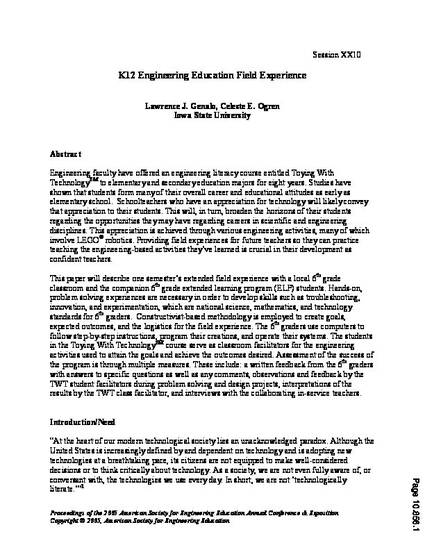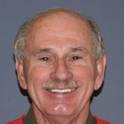
Presentation
K12 Engineering Education Field Experience
Proceedings of the ASEE Annual Conference
Document Type
Conference Proceeding
Disciplines
Conference
2005 Annual Conference
Publication Version
Published Version
Publication Date
1-1-2005
Conference Title
2005 Annual Conference
Conference Date
June 12-15, 2005
Geolocation
(45.5230622, -122.67648159999999)
Abstract
Engineering faculty have offered an engineering literacy course entitled Toying With TechnologySM to elementary and secondary education majors for eight years. Studies have shown that students form many of their overall career and educational attitudes as early as elementary school. Schoolteachers who have an appreciation for technology will likely convey that appreciation to their students. This will, in turn, broaden the horizons of their students regarding the opportunities they may have regarding careers in scientific and engineering disciplines. This appreciation is achieved through various engineering activities, many of which involve LEGO© robotics. Providing field experiences for future teachers so they can practice teaching the engineering-based activities they’ve learned is crucial in their development as confident teachers.
This paper will describe one semester’s extended field experience with a local 6th grade classroom and the companion 6th grade extended learning program (ELP) students. Hands-on, problem solving experiences are necessary in order to develop skills such as troubleshooting, innovation, and experimentation, which are national science, mathematics, and technology standards for 6th graders. Constructivist-based methodology is employed to create goals, expected outcomes, and the logistics for the field experience. The 6th graders use computers to follow step-by-step instructions, program their creations, and operate their systems. The students in the Toying With TechnologySM course serve as classroom facilitators for the engineering activities used to attain the goals and achieve the outcomes desired. Assessment of the success of the program is through multiple measures. These include: a written feedback from the 6th graders with answers to specific questions as well as any comments, observations and feedback by the TWT student facilitators during problem solving and design projects, interpretations of the results by the TWT class facilitator, and interviews with the collaborating in-service teachers.
Copyright Owner
American Society for Engineering Education
Copyright Date
2005
Language
en
File Format
application/pdf
Citation Information
Lawrence James Genalo and Celeste E. Ogren. "K12 Engineering Education Field Experience" Portland, ORProceedings of the ASEE Annual Conference (2005) p. 1 - 8 Available at: http://works.bepress.com/lawrence_genalo/9/

This is a conference proceeding from Proceedings of the ASEE Annual Conference (2005): 1. Posted with permission.